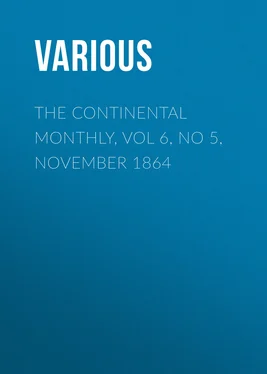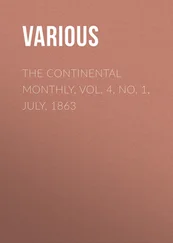Various - The Continental Monthly, Vol 6, No 5, November 1864
Здесь есть возможность читать онлайн «Various - The Continental Monthly, Vol 6, No 5, November 1864» — ознакомительный отрывок электронной книги совершенно бесплатно, а после прочтения отрывка купить полную версию. В некоторых случаях можно слушать аудио, скачать через торрент в формате fb2 и присутствует краткое содержание. Жанр: foreign_antique, periodic, Языкознание, Политика, foreign_edu, на английском языке. Описание произведения, (предисловие) а так же отзывы посетителей доступны на портале библиотеки ЛибКат.
- Название:The Continental Monthly, Vol 6, No 5, November 1864
- Автор:
- Жанр:
- Год:неизвестен
- ISBN:нет данных
- Рейтинг книги:4 / 5. Голосов: 1
-
Избранное:Добавить в избранное
- Отзывы:
-
Ваша оценка:
- 80
- 1
- 2
- 3
- 4
- 5
The Continental Monthly, Vol 6, No 5, November 1864: краткое содержание, описание и аннотация
Предлагаем к чтению аннотацию, описание, краткое содержание или предисловие (зависит от того, что написал сам автор книги «The Continental Monthly, Vol 6, No 5, November 1864»). Если вы не нашли необходимую информацию о книге — напишите в комментариях, мы постараемся отыскать её.
The Continental Monthly, Vol 6, No 5, November 1864 — читать онлайн ознакомительный отрывок
Ниже представлен текст книги, разбитый по страницам. Система сохранения места последней прочитанной страницы, позволяет с удобством читать онлайн бесплатно книгу «The Continental Monthly, Vol 6, No 5, November 1864», без необходимости каждый раз заново искать на чём Вы остановились. Поставьте закладку, и сможете в любой момент перейти на страницу, на которой закончили чтение.
Интервал:
Закладка:
It is not strange it has taken us three years to find who can fight among us. The Germans fought fifty years against religious despotism before they found Gustavus Adolphus to lead them to victory. The English fought ten years before Cromwell took command of his Ironsides. The French blundered ten years before the 'little corporal' led the army of the republic over the Alps to dethrone half the monarchs of Europe. The people had but one great general in the Revolutionary War. Until 1860 the aristocracy had furnished the only great American commander. But great generals have now appeared among the people; and if we fight stoutly and treat men fairly, our commander will appear when his army of veterans is ready.
The aristocracy at first moved armies faster than the people, for the same reason that the Tartars, the Cossacks, the Arabs, the Indians, and all semi-barbarians move more rapidly in war than a civilized people. A semi-barbarous oligarchy fights because it loves war; a civilized people fights to establish civilization and peace . The Southern army carries little along, lives on the food and wears the dress of the semi-savage, and overruns vast spaces, leaving a smoking desolation and a ruined society. The Northern army moves slowly, because it carries American civilization in its knapsack and baggage wagons, organizes republican society as it goes, and prepares to hold for liberty all it has gained. The people's army has paved the way for liberty and a democratic order of society over two hundred thousand square miles, among four millions of people, in three years. New Orleans, Nashville, Memphis, Beaufort, Alexandria, every slave city in our possession, is being made over into a free city.
The army goes slow because it is only the people's pioneer to level the mountains and fill up the valleys, and construct the highway of liberty from the Potomac to the Rio Grande. The Secretary of State has well said: ' The war means the dissolution of slave society. ' It was entered into with the distinct understanding that it was the last expedient to save the negro oligarchy from ruin, and every day it goes on its thundering course it more emphatically pronounces its doom. The war for the Union is the people's final contest for liberty, a contest in which they will be victorious, as in the strife of industry, morals, and politics. The people, like John Brown's soul, are 'marching on' to dissolve the slave oligarchy and establish democracy. The people now possess three fourths the territory, population, and wealth of the republic. There are yet some six million black and white people in the South to rescue from their masters, who now use them against us. They are being prepared for Union with us by this war. The poor white man will be made better, more intelligent, more ambitious even, by service in the rebel army, and on the return of peace will become the small farmer of a free soil. The black men will be raised, in due time made freemen, and start as a free peasantry on a new career. A hundred thousand slaveholders, with their families, not more than one million of people in all, will hate the Union permanently. They will be defeated, we hope and believe, and disorganized as a social and political power, and the people rule in every State they have cursed by their ambition for the last fifty years.
We do not prophesy just when or how the people will triumph. The victory, we believe, will come; but whether all at once, or through temporary revulsions of purpose and alternate truce and war, whether finished by arms or yet cast again into the arena of polities, whether by occupying all this three millions of square miles of territory or gaining on despotism year by year, nobody knows. The Slave Power has not yet played its trump card. It has a hundred devilish resources yet to foil us. It may yet try to use the negroes it still holds against us by emancipation. It may yet drag us into a war with Europe, and Saratoga and Lake Erie and Plattsburg, and Long Island and Trenton and Bunker Hill, and Detroit and New Orleans may yet be fought over again. But we have seen how, for the last forty years, the people of the United States have strode on toward supremacy, led by a Power they did not always recognize, and sometimes scorned, but led to victory spite of themselves.
There has indeed been a Divine Intelligence guiding the destiny of our republic by the 'higher law' of the progress of free society toward a Christian democracy. We do not think the Peace Party will be able to abolish that 'higher law,' as certain of our politicians expect. We believe God Almighty is shaping a free and exalted civilized nation out of this republic, by a law of progress which we did not make and cannot repeal. We may postpone that nation by our folly and sins, but it must be made. Through labor and education, and religion and arts, and politics and war, 'it marches' on to supremacy— the people's nation . And when it is established it will be the controlling nation of this continent, one of the firmest powers on the earth, the terror of every aristocracy, and the joy and hope of every people on the round globe.
THE UNDIVINE COMEDY-A POLISH DRAMA
PART III
'Il fut administé, parceque le niais demandait un prètre, puis pende à la satisfaction generale,' etc, etc.— Rapport du citoyen Gaillot, commissaire de la sixième chambre, an III., 5 prairial.
'The sacraments were administered to him, because the fool demanded a priest; he was hung to the general satisfaction.'— Report of citizen Gaillot, commissary of the sixth session, 3d year, 5th prairial.
A song! a new song!
Who will begin it? Who will end it?
Give me the Past, clad in steel, barbed with iron, floating in knightly plumes! With magic power I would invoke before you gothic towers and castellated turrets, bristling barbacans and mighty arches, baronial halls and clustered shafts; I would throw around you the giant shadows of vaulted domes and of revered cathedrals: but it may not be; all that is with the Past: the Past is never to return!
Speak, whosoever thou mayst be, and tell me in what thou believest! It is easier to lose thy life than to invent a faith; to awaken any belief in it!
Shame upon you all, great and small, for all things pursue their own course in defiance of your schemes! You may be mean and wretched, without hearts and without brains, yet the world hastens to its allotted destiny; it hurries you on whether you will or no, throws you in the dust, tosses you into wild confusion, or whirls you in resistless circles, which cease not until they grow into dances of Death! But the world rolls on—on; clouds and storms arise and vanish; then it grows slippery—new couples join the dance of Death—they totter—fall—lost in an abyss of blood—for it is slippery-blood-human blood is gushing everywhere, as if the path to peace led through a charnel house!
Behold the crowds of people thronging the gates of the cities, the hills, the valleys, and resting beneath the shadows of the trees! Tents are spread about, long boards are placed on the trunks of fallen trees or on pikes and sticks to serve as tables; they are covered with meat and drink, the full cups pass from hand to hand, and, as they touch the eager mouth, threats, oaths, and curses press forth from the hot lips. Faster and faster fly the cups from hand to hand, beaded, bubbling, glittering, always filling, striking, tinkling, ringing, as they circle among the millions: Hurrah! hurrah! Long live the cup of drunkenness and joy!
How fiercely they are agitated; how impatiently they wait! They murmur, they break into riotous noise!
Poor wretches! scarcely covered with their miserable rags, the seal of weary labors deeply stamped upon their sunburnt faces set with uncombed, bristling hair, the sweat starting from their rugged brows, their strong and horny hands armed with scythes, axes, hammers, hatchets, spades!
Читать дальшеИнтервал:
Закладка:
Похожие книги на «The Continental Monthly, Vol 6, No 5, November 1864»
Представляем Вашему вниманию похожие книги на «The Continental Monthly, Vol 6, No 5, November 1864» списком для выбора. Мы отобрали схожую по названию и смыслу литературу в надежде предоставить читателям больше вариантов отыскать новые, интересные, ещё непрочитанные произведения.
Обсуждение, отзывы о книге «The Continental Monthly, Vol 6, No 5, November 1864» и просто собственные мнения читателей. Оставьте ваши комментарии, напишите, что Вы думаете о произведении, его смысле или главных героях. Укажите что конкретно понравилось, а что нет, и почему Вы так считаете.












